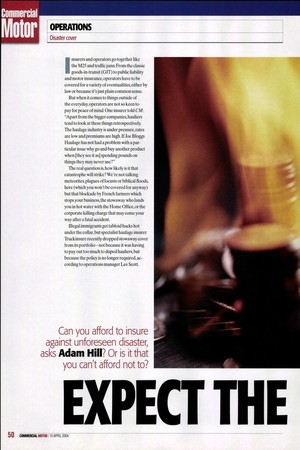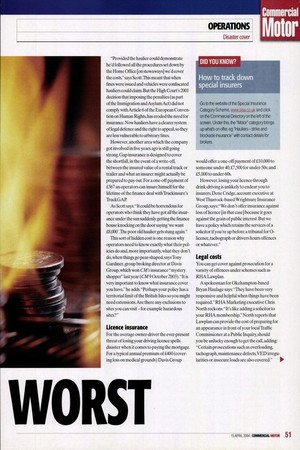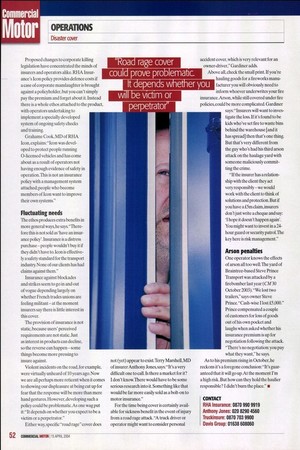EXPECT THE
Page 48

Page 49

Page 50

If you've noticed an error in this article please click here to report it so we can fix it.
WORST
Can you afford to insure against unforeseen disaster, asks Adam Hill? Or is it that
you can't afford not to?
Insurers and operators go together like the M25 and traffic jams. From the classic goods-in-transit (GIT) to public liability and motor insurance, operators have to be covered for a variety of eventualities, either by law or because it's just plain common sense.
But when it comes to things outside of the everyday, operators are not so keen to pay for peace of mind. One insurer told CM: "Apart from the bigger companies, hauliers tend to look at these things retrospectively. The haulage industry is under pressure, rates are low and premiums are high. If Joe Bloggs Haulage has not had a problem with a particular issue why go and buy another product when [they see it as] spending pounds on things they may never use?"
The real question is, how likely is it that catastrophe will strike? We're not talking meteorites, plagues of locusts or biblical floods, here (which you won't be covered for anyway) but that blockade by French farmers which stops your business, the stowaway who lands you in hot water with the Home Office, or the corporate killing charge that may come your way after a fatal accident.
Illegal immigrants get tabloid hacks hot under the collar, but specialist haulage insurer Truckinsure recently dropped stowaway cover from its portfolio—not because it was having to pay out too much to duped hauliers, but because the policy is no longer required, according to operations manager Lee Scott.
"Provided the haulier could demonstrate he'd followed all the procedures set down by the Home Office [on stowaways] we'd cover the costs," says Scott.This meant that when fines were issued and vehicles were confiscated hauliers could claim. But the High Court's 2001 decision that imposing the penalties (as part of the Inunigration andAsylumAct) did not comply with Article 6 of the European Convention on Human Rights, has eroded the need for insurance. Now hauliers have a clearer system of legal defence and the right to appeal, so they are less vulnerable to arbitrary fmes.
However, another area which the company got involved in five years ago is still going strong. Gap insurance is designed to cover the shortfall, in the event of a write-off, between the insured value of a rental truck or trailer and what an insurer might actually be prepared to pay out. For a one-off payment of £367 an operators can insure himself for the lifetime of the finance deal withTruckinsure's TruckGAP.
As Scott says: "It could be horrendous for operators who think they have got all the insurance under the sun suddenly getting the finance house knocking on the door saying 'we want £8,000' .The poor old haulier gets stung again."
This sort of hidden cost is one reason why operators need to know exactly what their policies do and, more importantly, what they don't do, when things go pear-shaped, says Tony Gardiner, group broking director at Davis Group, which won CM'S insurance "mystery shopper" last year (CM 9 October 2003)."It is very important to know what insurance cover you have," he adds. "Perhaps your policy has a territorial limit of the British Isles so you might need extensions. Are there any exclusions to sites you can visit for example hazardous sites?" Licence insurance For the average owner-driver the ever-present threat of losing your driving licence spells disaster when it comes to paying the mortgage. For a typical annual premium of £400 (covering loss on medical grounds) Davis Group
would offer a one-off payment of £10,000 to someone under 40; £7,500 for under-50s; and £5,000 to under-60s.
However, losing your licence through drink-driving is unlikely to endear you to insurers. Dene Cridge, account executive at West Thurrock-based Wrightsure Insurance Group, says: "We don't offer insurance against loss of licence [in that case] because it goes against the grain of public interest. But we have a policy which retains the services of a solicitor if you're up before a tribunal for 0licence, tachograph or drivers hours offences or whatever." Legal costs
You can get cover against prosecution for a variety of offences under schemes such as RHA Lawplan. A spokesman for Okehampton-based Bryan Haulage says: "They have been very responsive and helpful when things have been required." RHA Marketing executive Chris North reckons: "It's like adding a solicitor to your RHA membership." North reports that Lawplan can provide the cost of preparing for an appearance in front of your local Traffic Commissioner at a Public Inquiry, should you be unlucky enough to get the call, adding: "Certain prosecutions such as overloading, tachograph, maintenance defects,VED irregu larities or insecure loads are also covered." O■ Proposed changes to corporate killing legislation have concentrated the minds of insurers and operators alike. RHA Insurance's Icon policy provides defence costs if a case of corporate manslaughter is brought against a policyholder, but you can't simply pay the premium and forget about it. Instead there is a whole ethos attached to the product,
with operators undertaking to implement a specially developed system of ongoing safety checks and training.
Grahame Cook, MD of RHA Icon, explains: "Icon was developed to protect people running 0-licensed vehicles and has come about as a result of operators not having enough evidence of safety in operation.This is not an insurance policy with a management system attached; people who become members of Icon want to improve their own systems." Fluctuating needs
The ethos produces extra benefits in more general ways, he says."Therefore this is not sold as 'have an insurance policy'. Insurance is a distress purchase—people wouldn't buy it if they didn't have to. Icon is effectively a safety standard for the transport industry. None of our clients has had claims against them."
Insurance against blockades and strikes seem to go in and out of vogue depending largely on whether French trades unions are feeling militant —at the moment insurers say there is little interest in this cover. The provision of insurance is not static, because users' perceived requirements are not static. Just as interest in products can decline, so the reverse can happen — some
things become more pressing to insure against.
Violent incidents on the road, for example, were virtually unheard of 10 years ago. Now we are all perhaps more reticent when it comes to showing our displeasure at being cut up for fear that the response will be more than mere hand gestures. However, developing such a policy could be problematic.As one wag put it: "It depends on whether you expect to be a victim or a perpetrator." Either way, specific "road rage" cover does
not (yet) appear to exist.Terry Marshell,MD of insurer Anthony Jones, says: "It's a very difficult one to call. Is there a market for it? I don't know.There would have to be some serious research into it. Something like that would be far more easily sold as a bolt-on to motor insurance." For the time being cover is certainly available for sickness benefit in the event of injury from a road rage attack. "A truck driver or operator might want to consider personal
accident cover, which is very relevant for an owner-driver," Gardiner adds. Above all, check the small print. If you're hauling goods for a fireworks manufacturer you will obviously need to inform whoever underwrites your fire insurance. Arson, while still covered under fire policies, could be more complicated. Gardiner
says: "Insurers will want to investigate the loss. If it's found to be kids who've set fire to waste bins behind the warehouse [and it has spread] then that's one thing. But that's very different from the guy who's had his third arson attack on the haulage yard with someone maliciously committing the crime.
"If the insurer has a relationship with the client they act very responsibly—we would work with the client to think of solutions and protection. But if you have a Om claim, insurers don't just write a cheque and say: 'I hope it doesn't happen again'. You might want to invest in a 24hour guard or security patrol.The key here is risk management." Arson penalties
One operator knows the effects of arson all too well.The yard of Braintree-based Steve Prince Transport was attacked by a firebomber last year (CM 30 October 2003)."We lost two trailers," says owner Steve Prince." Cash-wise I lost I5,000." Prince compensated a couple of customers for loss of goods out of his own pocket and laughs when asked whether his insurance premium is up for negotiation following the attack. "There's no negotiation: you pay what they want," he says. As to his premium rising in October, he reckons it's a foregone conclusion: "It's guaranteed that it will go up.At the moment I'm a high risk. But how can they hold the haulier responsible? I didn't burn the place." •
























































































































































































